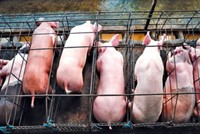Advertisement
Grab your lab coat. Let's get started
Welcome!
Welcome!
Create an account below to get 6 C&EN articles per month, receive newsletters and more - all free.
It seems this is your first time logging in online. Please enter the following information to continue.
As an ACS member you automatically get access to this site. All we need is few more details to create your reading experience.
Not you? Sign in with a different account.
Not you? Sign in with a different account.
ERROR 1
ERROR 1
ERROR 2
ERROR 2
ERROR 2
ERROR 2
ERROR 2
Password and Confirm password must match.
If you have an ACS member number, please enter it here so we can link this account to your membership. (optional)
ERROR 2
ACS values your privacy. By submitting your information, you are gaining access to C&EN and subscribing to our weekly newsletter. We use the information you provide to make your reading experience better, and we will never sell your data to third party members.
Antibiotics
Stringent policies decrease antibiotic resistance
by Britt E. Erickson
March 2, 2019
| A version of this story appeared in
Volume 97, Issue 9

Policies adopted by some countries to limit the use of antibiotics in livestock are leading to a decrease in antimicrobial resistance, concludes a report by the European Centre for Disease Prevention and Control and the European Food Safety Authority. The report suggests, however, that more countries need to adopt such policies because antibiotics are becoming less effective at killing bacteria that can be transmitted between animals and humans. The report highlights data from 2017, showing campylobacter and salmonella are increasingly resistant to fluoroquinolones. The report also shows that a high proportion of camplylobacter are resistant to tetracyclines. “We are entering into a world where more and more common infections become difficult—or even sometimes impossible—to treat,” Vytenis Andriukaitis, commissioner for Health and Food Safety in the European Union, said in a statement. The European Commission adopted an action plan in 2017 to encourage the prudent use of antimicrobials among the 28 EU countries.



Join the conversation
Contact the reporter
Submit a Letter to the Editor for publication
Engage with us on Twitter